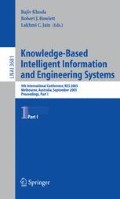Abstract
In constructing a knowledge-based system, knowledge acquisition plays a critical role. It is the most time-consuming phase and has been recognized as the bottleneck in the development of a knowledge-based system. This paper describes a matrix representation and mapping (MRM) approach to facilitate the knowledge acquisition process in building the knowledge bases. The MRM approach involves six consecutive steps: knowledge sources identification, taxonomic tree generation, identification of linkages between conditions and conclusions sets, generation of sub-clauses to form IF and THEN clauses, identification of logical interrelationship among sub-clauses and rule generation. The proposed approach has established an integral and complete process for knowledge acquisition.
Access this chapter
Tax calculation will be finalised at checkout
Purchases are for personal use only
Preview
Unable to display preview. Download preview PDF.
References
Gonzalez, A.J., Dankel, D.D.: The Engineering of Knowledge-based Systems. Theory and Practice. Prentice-Hall, Inc., Englewood Cliffs (1993)
Shao, X., Zhang, G., Li, P., Chen, Y.: Application of ID3 algorithm in knowledge acquisition for tolerance design. Journal of Materials Processing Technology 117, 66–74 (2001)
Chen, C.-H., Occena, L.G.: Knowledge sorting process for a product design expert system. Expert Systems 16, 170–182 (1999)
Wu, C.H., Kao, S.C.: Induction-based approach to rule generation using membership function. International Journal of Computer Integrated Manufacturing 15, 86–96 (2002)
Wong, M.L.: An adaptive knowledge-acquisition system using generic genetic programming. Expert Systems with Applications 15, 47–58 (1998)
Wu, C.H., Kao, S.C.: GDKAT: A goal-driven knowledge acquisition tool for knowledge base development. Expert Systems. 17, 90–105 (2000)
Qiu, D.: Certainty factor theory and its implementation in an information system-oriented expert system shell. Applied Artificial Intelligence 6, 147–166 (1992)
Guan, J.W., Guan, Z., Bell, D.A.: Bayesian probability on Boolean algebras and applications to decision theory. Information Sciences 97, 267–292 (1997)
Shafer, G.: A Mathematical Theory of Evidence. Princeton University Press, Princeton (1976)
Zadeh, L.A.: Fuzzy Sets. Information and Control 8, 338–353 (1965)
Author information
Authors and Affiliations
Editor information
Editors and Affiliations
Rights and permissions
Copyright information
© 2005 Springer-Verlag Berlin Heidelberg
About this paper
Cite this paper
Rao, Z., Chen, CH. (2005). A Matrix Representation and Mapping Approach to Knowledge Acquisition for Product Design. In: Khosla, R., Howlett, R.J., Jain, L.C. (eds) Knowledge-Based Intelligent Information and Engineering Systems. KES 2005. Lecture Notes in Computer Science(), vol 3681. Springer, Berlin, Heidelberg. https://doi.org/10.1007/11552413_45
Download citation
DOI: https://doi.org/10.1007/11552413_45
Publisher Name: Springer, Berlin, Heidelberg
Print ISBN: 978-3-540-28894-7
Online ISBN: 978-3-540-31983-2
eBook Packages: Computer ScienceComputer Science (R0)

